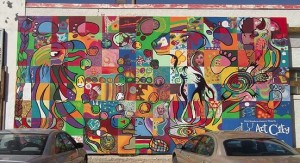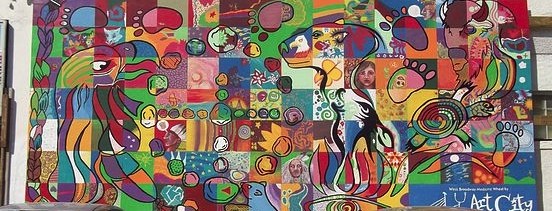Welcome to this blog! Here you can join me on my Distance Education adventures, and learn more about Canadian literature as part of the UBC course ENGL 470A: Canadian Studies: Canadian Literary Genres, as taught by Dr. Erika Paterson.
This course will examine Canadian literature, storytelling and stories. As a country with a settler-colonial history, Canadian literature and storytelling is grounded in both Aboriginal traditions and those of the settlers. As a former European colony, Canada’s literature has strong roots in the trends and traditions of European literature. This course will cover all of these literary traditions, and how they interact with one another.
Who am I? I am in my final semester of my undergraduate degree, a Bachelor of Arts in Human Geography. For most of the semester I will rooted in Winnipeg, Manitoba (and jealously reading the temperature forecasts for the Lower Mainland!). This class comprises the one of two electives I am taking this term (both online). The other is about Victorian literature, which I think will add context to my studies in this course.
All complaining about the weather aside, Winnipeg is a really great place, and I am excited to be located here while I am taking this course. There is a fair amount of progressive action happening here regarding Indigenous issues, and various institutions here, such as the Canadian Museum for Human Rights, the Arbiter Publishing Ring publishing house, and the University of Winnipeg (see below) are part of that.

One of the many cultural focused murals in Winnipeg. This one is entitled “Medicine Wheel Mural”. Designed and produced by Jackie Travers in collaboration with Art City, Winnipeg.
As I chose to take this course voluntarily (out of an interest in the subject matter), I found the debate presented in the comments section in this article by CBC (about the mandatory indigenous studies course requirement newly instated at the University of Winnipeg) interesting (for a counterpoint argument regarding this issue, see Josh Dehaas’ article in Maclean’s). I’m not sure where I stand on this matter.
The last five books by Canadian authors that I have read are: In The Skin of a Lion (in progress) by Michael Ondaatje; The Handmaid’s Tale (a re-read for a UBC course last year) and MaddAdam, both by Margaret Atwood; The Book of Negros, by Lawrence Hill; and Three Day Road, by Joseph Boyden. Many of these choices have been informed by the books nominated on the CBC show Canada Reads. I think that the authors included in this selection are a good representative sample of Canada’s demographics, and it will be intriguing to consider these books, in terms of genre and literary traditions, after I have finished this course.
What I look forward to in this course is the study of literature through both historical and contemporary lenses, as well as looking at stories through intersectional lenses. I am excited about the blogging component, as I believe being able to engage in course content concisely and critically on New Media platforms is a useful and transferrable skill. I expect to become more competent at blogging, and more importantly, have a stronger ability to critically assess how the intersections of history, culture, power, and race reflect in how Canadian literature is both read and produced.
- A note on terminology – I will be using the terminology guidelines set by the First Nations Studies Program at UBC, which can be found here.
Works Cited
CBCBooks. “Canada Reads 2016 Longlist”. CBC Books. CBC/Radio Canada, n.d. Website. January 12th, 2016.
CBC News. “University of Winnipeg makes indigenous course a requirement”. CBC News, Nov. 20, 2015. Website. January 13th, 2016.
Dehass, Josh. “Why Indigenous Studies Shouldn’t Be Mandatory”. Maclean’s, Feb. 23, 2012. Website. January 13th, 2016.
First Nations Studies Program. “Terminology”. indigenousfoundations.arts.ubc.ca. University of British Columbia, 2009. Website. January 12th, 2016.
Jackie Travers and Art City. “Medicine Wheel Mural”. 2012. Mural painted on side of building. Winnipeg, Manitoba.
Paterson, Erika. ENGL 470A: Canadian Studies: Canadian Literary Genres. University of British Columbia, Jan. 2016. Web. January 13th, 2016.
University of Winnipeg Students’ Association. “Indigenous Credit Requirement (ICR)”. University of Winnipeg Students’ Association, n.d. Web. January 13th, 2016.

Hi Merriam!
I’m also in the final semester of my undergraduate degree, but for English Literature instead. I just commented on another one of our classmates’ blogs (Alex’s) right here: https://blogs.ubc.ca/engl470aohcanada/2016/01/12/assignment-11-an-introduction/
I would have made that a hyperlink, but I don’t know if UBC Blogs’ WordPress allows HTML in the comments.
Oh man, I hope you survive the rest of winter! But even though I’m not envious of the cold over there, it’s really interesting to see the amount of activity regarding Indigenous issues in Winnipeg that you’ve outlined in your blog post. The article you’ve posted from CBC is really interesting, as well as the counterpoint argument from Maclean’s. Although I’m also unsure of where to stand on the matter, at least we can see that this conflict of opinions reveals that unresolved social tension.
I’m looking forward to a semester with you! Good luck with your readings!
Hey! I posted my full reply as another comment (see below). I tested the hyperlinks out after I read your comment – it’s a green light!
Hi Brendan,
Thanks for checking out my blog! I did use the link you provided to view your comment on Alex’s blog…It would seem that you have a thing for human geographers (lol)! We are a pretty awesome department, so that’s understandable.
I recently moved back to Winnipeg from Vancouver (where I was living for three years). I would say both cities place a significant amount of focus on Indigenous issues within the political/social/cultural spheres, but do so in differing fashions. Quite a bit of this focus stems from the recent Truth and Reconciliation Commission – here in Winnipeg there have been a few very interesting artistic events, one being the ballet Going Home Star – Truth and Reconciliation developed and performed by the RWB. They are going on tour, so if you are in to ballet, you should check it out!
Hi Merriam,
The debate you’ve brought to light about the required indigenous course at the University of Winnipeg brings some really interesting questions to light. I think overall I agree more with the author of the Macleans article, although I find his way of putting it to be a bit heavy-handed. In terms of how another required credit would affect engineering and science students, I am still on the fence. You could make the same argument about their one required humanities course; the only difference is that it’s been around long enough to be accepted. When is required breadth too much and when is it too little? A very difficult question to answer. What I do find myself agreeing with in the Maclean’s article is the sentiment that we have already learned enough about indigenous cultures in our elementary and high school education that it should not be required in university as well. This is not because I believe that at some point we have learned ‘enough’ about indigenous culture so as to render further education unnecessary. I believe this because I’ve seen how little impact the indigenous education I received as a student had on myself and my peers in terms of our relationships with aboriginal people. While we learned extensively about *their* history, it was always just that. The divide between ‘us’ and ‘them’ was so prevalent in all the education I received as a child, and not to mention rife with implicit white guilt. I think what we need to change is how we teach children about indigenous peoples rather than the quantity of education. I’m not sure exactly what this would look like, but certainly something more inclusive and relatable.
I’d love to know your thoughts 🙂
Caitlin
Caitlin, thank you so much for your response. I’m still very stuck as to how I feel about this topic. Your experience about the impact – or lack thereof – of the indigenous education that you and your peers received in grade and middle school is similar to my own. I do agree wholeheartedly that it is the quality and method of education that needs to be addressed. I’d like to find out more about why proponents of mandatory classes believe that primary and secondary curriculums have not adequately educated students in these issues, enough to mandate a university level course. I do think that publicly funded educational systems should hold a lot of the weight/responsibility for social/educational matters such as these.